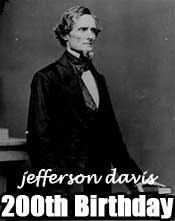 Should We Remember U.S. War Veteran Jefferson Davis or Should History Hang Him for Treason?
Should We Remember U.S. War Veteran Jefferson Davis or Should History Hang Him for Treason?
Some Say We Should Celebrate His 200th Birthday
It hasn’t been so easy getting people excited about celebrating the 200th birthday of that tall, gaunt, bearded, Kentucky-bred president who was born in a log cabin and went on to lead his people through a bloody civil war.
No, not Abraham Lincoln. Last week, President Bush himself helped kick off a two-year celebration of the Great Emancipator’s Feb. 12, 2009, bicentennial that will include dozens of events in Kentucky, Illinois, Washington and beyond.
It’s that other tall, log cabin-born Kentuckian, Jefferson Davis, whose 200th has turned out to be something of a lost cause.
|
Jefferson Finis Davis (June 3, 1808 – December 6, 1889) was an American politician who served as President of the Confederate States of America for its entire history from 1861 to 1865 during the American Civil War. During his presidency, Davis was never able to find a strategy that would defeat the larger, more industrially developed Union. Davis’s insistence on independence, even in the face of crushing defeat, prolonged the war, and while not exactly disgraced, he was displaced in Southern affection after the war by the leading general, Robert E. Lee. After Davis was captured in 1865, he was charged but not convicted with treason and was stripped of his eligibility to run for public office. This disability was removed in 1978, 89 years after his death. A West Point graduate, Davis prided himself on the military skills he gained in the Mexican-American War as a colonel of a volunteer regiment, and as U.S. Secretary of War under Franklin Pierce. |
"The response to date has been timid," acknowledges Bertram Hayes-Davis, head of the Davis Family Association and great-great grandson of the only president of the short-lived Confederate States of America. "Nobody has said no. Many haven’t said yes."
Because Davis was a former secretary of war, Hayes-Davis wrote to the Department of Defense to see if it was interested in participating in some activity "to educate the public about the real Jefferson Davis." The agency didn’t even reply.
Even Mississippi, the state where Davis made his plantation fortune and to which he retired after the war, gave the idea of commemorating Davis a lukewarm reception. A bill to establish a commission "for the purpose of organizing and planning a celebration in recognition of Jefferson Davis’ 200th birthday" easily passed the House, only to die in the Senate appropriations committee.
Crowning of ‘Miss Confederacy’
Oh, there will be a "Miss Confederacy" crowned during the June 7-8 festival at the Jefferson Davis State Historic Site in Fairview, Ky., where a 351-foot concrete obelisk stands near the site of Davis’ cabin birthplace. But that’s an annual event.
The Davis Family Association is holding its reunion May 31 through June 1 at the Rosemont Plantation, Davis’ childhood home in Woodville, Miss.
And on June 3, Davis’ actual birthdate, the family will gather in Biloxi for the rededication of Beauvoir House, the hip-roofed, Gulf-front mansion where Davis spent the last 12 years of his life and which was nearly swept away by Hurricane Katrina in 2005.
Last week, Hayes-Davis stood on the Corinthian-columned portico of the Alabama State Capitol in Montgomery to re-enact the inaugural ceremony with which his ancestor formally severed the Southern states from the federal government he felt had been "perverted from the purposes for which it was ordained."
Taking his place on a six-pointed brass star marker alongside the great-great grandson of Howell Cobb, president of the Provisional Confederate Congress, Hayes-Davis placed his right hand on the Alabama State Bible used in the original swearing-in 147 years earlier. Hayes-Davis did not recite the oath, but simply kissed the Bible as his ancestor did, turned to the crowd and said: "So help me God."
But Davis events are well, a bit anemic — especially compared to the hoopla surrounding the 16th president.
That’s to be expected, says William J. Cooper, a professor of history at Louisiana State University and author of "Jefferson Davis, American."
Lincoln "saved the Union. He emancipated the slaves. I mean, he won the war," Cooper says. "Fighting against Lincoln is, you know, fighting against motherhood."
|
U.S. War Veteran Davis The Mexican American War The year 1846 saw the beginning of the Mexican-American War. He resigned his House seat in June, and raised a volunteer regiment, the Mississippi Rifles, becoming its colonel. On July 21, 1846 they sailed from New Orleans for the Texas coast. Davis armed the regiment with percussion rifles and trained the regiment in their use, making it particularly effective in combat. In September of the same year, he participated in the successful siege of Monterrey, Mexico. He fought bravely at the Battle of Buena Vista on February 22, 1847, and was shot in the foot, being carried to safety by Robert H. Chilton. In recognition of Davis’s bravery and initiative, commanding general Zachary Taylor is reputed to have said, "My daughter, sir, was a better judge of men than I was." President James K. Polk offered him a Federal commission as a brigadier general and command of a brigade of militia. He declined the appointment, arguing that the United States Constitution gives the power of appointing militia officers to the states, and not to the Federal government of the United States. |
One man’s legacy, a family’s struggle
For the most part, if Davis is mentioned at all this year outside the classroom or a Southern museum exhibit, it will be in the context of symposia like "The Contested Legacy of Jefferson Davis," a scholarly discussion being hosted this June by the Thomas D. Clark Center for Kentucky History in Frankfort, at which Cooper is scheduled to be the keynote speaker.
The Davis family thinks it’s a shame that all most people know about him was that he fought to preserve slavery.
"It’s as if he created the entire institution and was solely responsible for it," says Hayes-Davis, a 59-year-old banker from Colorado Springs, Colo. "And we struggle with that."
Most people don’t know that Davis was a West Point graduate who fought in the Mexican War under Zachary Taylor and married the future president’s daughter, Hayes-Davis says. As a U.S. senator from Mississippi, he had a hand in building the Smithsonian Institution. He bolstered the nation’s defenses as secretary of war under President Franklin Pierce.
"The history books, which are basically written in New York and Boston and whatever, have one sentence: ‘Jefferson Davis elected president of the Confederacy,’" his descendant complains.
A ‘bitter-ender’
Historian James M. McPherson concedes that Davis’ antebellum career was "very illustrious." But he says his achievements as a soldier, senator and secretary of war were "largely eclipsed" by his role in setting the stage for and then waging the bloodiest war in this nation’s history.
Davis, who disparagingly referred to his fellow Kentuckian as "His Majesty Abraham the First," was what McPherson calls a "bitter-ender." When Lincoln allowed a journalist and a minister through Union lines in July 1864 under a flag of truce to offer peace and amnesty to Davis, the Confederate president was outraged.
"Amnesty, Sir, applies to criminals," he told the envoys. "We have committed no crime. At your door lies all the misery and crime of this war … We are fighting for Independence — and that, or extermination, we will have … You may emancipate every Negro in the Confederacy, but we will be free. We will govern ourselves … if we have to see every Southern plantation sacked, and every Southern city in flames."
McPherson, a Lincoln biographer who won the Pulitzer Prize for his Civil War epic, "Battle Cry of Freedom," says some former Confederates, like Gen. Robert E. Lee, are palatable to modern Americans.
"Because Lee not only emerged as the foremost icon and hero of the Civil War in the South, I think he also emerged in the postwar North and is seen even today as somebody with more admirable qualities than Jefferson Davis," he says.
Davis comes across, McPherson says, as an "unreconstructed rebel who never really accepted with anything like good grace the defeat of the Confederacy and continued for the rest of his life to write and speak in a way that basically said, ‘We were right. We lost this war, not because we were wrong, but because the enemy was more powerful and more ruthless.’"
Indeed, the last paragraph of Davis’s two-volume "The Rise and Fall of the Confederate Government" — penned at Beauvoir and often called "the Bible of the Lost Cause" — can hardly be seen as an apology.
 "In asserting the right of secession," Davis wrote, "it has not been my wish to incite to its exercise: I recognize the fact that the war showed it to be impracticable, but this did not prove it to be wrong; and, now that it may not be again attempted, and that the Union may promote the general welfare, it is needful that the truth, the whole truth, should be known, so that crimination and recrimination may for ever cease, and then, on the basis of fraternity and faithful regard for the rights of the States, there may be written on the arch of the Union, Esto perpetua."
"In asserting the right of secession," Davis wrote, "it has not been my wish to incite to its exercise: I recognize the fact that the war showed it to be impracticable, but this did not prove it to be wrong; and, now that it may not be again attempted, and that the Union may promote the general welfare, it is needful that the truth, the whole truth, should be known, so that crimination and recrimination may for ever cease, and then, on the basis of fraternity and faithful regard for the rights of the States, there may be written on the arch of the Union, Esto perpetua."
Translation: "May it persevere."
Wrong perspective, says descendant
Hayes-Davis says his ancestor is a victim of political correctness and of people’s insistence on looking at historical events from today’s perspective.
He believes, as Davis did, that the Southern states had a constitutional right to secede. When asked if he thinks secession is viable or legal today, he is noncommittal.
"I think the issue is not so much the country splitting. I think the issue is federal control over the states. And I think that you see that even today, when federal mandates come from Washington that, `You will do this, whether you want to or not…,’" says Hayes-Davis, who has represented Davis’ family at more than 100 functions over the years.
As for events this year in connection with the bicentennial, biographer Cooper says he has no problem with descendants re-enacting Davis’ inauguration and the like.
"The Civil War is the central event in our nation’s history, and Davis had a critical part to play in that," Cooper says. "And not to study it makes no sense to me."
Just as long, he adds, as commemoration does not become celebration.
ATTENTION READERS
We See The World From All Sides and Want YOU To Be Fully InformedIn fact, intentional disinformation is a disgraceful scourge in media today. So to assuage any possible errant incorrect information posted herein, we strongly encourage you to seek corroboration from other non-VT sources before forming an educated opinion.
About VT - Policies & Disclosures - Comment Policy



